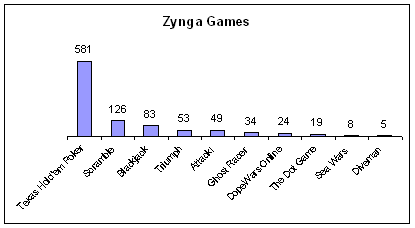Games as a hit driven business March 17, 2008
Posted by jeremyliew in business models, facebook, games, games 2.0, social games, social gaming, social networks.trackback
The games business has always been hit driven, and the move online hasn’t changed that. World of Warcraft alone commands 62% market share of all MMOGs. In the casual games business, the top 20 games constitute 75% of total industry revenue. As more games have launched onto Facebook, we still see a hit driven business. There is an order of magnitude change in the number of daily actives in just the top 25 games on Facebook:
Game, Daily Actives (‘000s)
Scrabulous, 697
Friends for Sale, 672
Texas Holdem Poker, 581
Compare people, 393
Lil Green Patch, 338
Speed Racing, 260
(fluff)Friends, 240
MindJolt, 189
Vampires, 156
PetrolHead, 144
Who Has The Biggest Brain, 135
Scramble, 126
Jetman, 121
My Heroes Ability, 96
Mesmo TV, 93
Have You Ever???, 86
Zombies, 85
Blackjack, 83
WereWolves, 79
Slayers, 77
Parking Wars, 68
Scratch and Win, 67
Fight Club, 64
Hotties For Sale, 59
WarBook, 56
The graph below makes this point even more dramatically, showing a strong power law distribution for the 2190 games on Facebook:
Game 100 has 6,000 daily actives, game 500 has 150 daily actives, game 1000 has 23, game 1500 has 6 and games 2000 and up have no daily actives at all.
In an environment with as long a tail as this, companies need to take a portfolio approach to their games. Zynga has taken the approach to cross promoting their new games on launch, to good effect:
Although Zynga’s games also show a power law distribution as well, all but one of their games has made it to the top 100 in daily actives.
Social Games Network has built its portfolio through a combination of cross promotion and acquisition.
Their power curve is not as pronounced because they have bought some successful games to fill out their portfolio.
The difference between SGN and Zynga is really one hit game, Texas Holdem Poker.
Social games companies that learn how to repeatably create and launch hit games will become very valuable.



[…] a race: Tight …Motor racing-Ferrari boss calls for calm after rough start Reuters UKwww.iht.comGames as a hit driven business The games business has always been hit driven, and the move online hasn??t changed that. World of […]
So if this is a power curve at large, why is this a good business for VC? Seems like any other bet – do or die?
Alex,
I (like other VCs) are looking for the teams and products that are more likely to fall at the head of the power curve since the distribution of value is so much greater for the winners.
I’d say that just about all startups show a power curve in any industry – its just that Facebook gives us metrics that make this more obvious. In other industries there is the potential of only seeing the hits and not knowing about the other 500 startups in the same industry that did not make it big.
now i discovered that much people play !
games is something for fun but not for wasting time
thanks for charts in the post .. looks nice article
I agree that, historically, the games business has always been about being in the “head” rather than the tail. However, content producers in this space have typically been heavily concentrated in resource-rich organizations with great distribution channels.
True to the long tail, the creation and distribution tools are becoming democratized, and terrific games are being delivered by individuals with nothing more than great ideas. This is very apparent in Facebook. Jetman, Warbook, The Dot Game, Diveman, etc.
So as great as it may be to be in the head, I believe the most important take away are the tools of production. There are lots of creative ideas, and I’d bet the field before I bet on one producer. What is the best way to get them onto the social platform – Kongregate, Zynga, Sharendipity, SGN, or …?
jeremy,
great post. zynga is focused on building highly popular social games. we are proud that we have built several growing properties in addition to poker. scramble has grown 600% since january and continues to grow at 10% a week. ghost racer and stickerz have been other good recent additions.
as you said, this may in the end be about hits, so next year’s leaders may be defined by who can build the next great properties.
we have also worked to develop network effects that can enable us and other game developers to rapidly introduce and build critical mass around new games. we have made this network effect available to other game devs via an api.
my hope is that a year from now there is one large interconnected channel available to all game devs, big and small. this channel should enable great games to grow more rapidly and well funded games to buy their way up the channel. this infusion of customer acquisition dollars will also serve as a key revenue source for the small game dev that *is* able to successfully leverage the channel.
my hope is that game pubs will strive to command larger shares of this channel rather than build many separate closed networks.
Jeremy,
What are your favorite Social Games and Why?
@ Sidney,
I like Scrabulous, Scramble, Friends for Sale, (fluff) Friends and Zombies (et al)
[…] But I’m guessing Apple would take it beyond this obvious conclusion. For one games are a hits driven business and second, they are not Apple’s strong suit. Apple also likes to appeal to wide audiences […]
I like Friends for Sale and Jetman